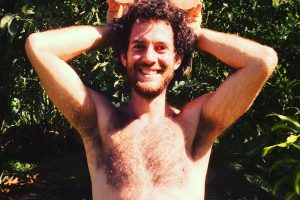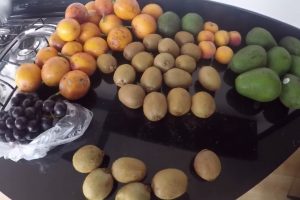Fruitarian Mango Wodzak, also known as Mango Durian, is the author of Destination Eden: Fruitarianism Explained and The Eden Fruitarian Guidebook: Another Book of Uncommon Sense. Mango Wodzak has been a fruitarian for many years and is one of the leading speakers in the world of fruitarianism. Mango Wodzak’s aproach to the fruitarian diet is heavily influenced by the empathy he feels towards plants, beings that he considers to have similar lives and experiences as humans do.
In this interview with Mango Wozak we cover some of my own personal curiosities regarding Mango Wodzak’s fruitarian lifestyle as well as some ideas covered in Mango’s new book: The Eden Fruitarian Guidebook.
If you want to read my reviews on Mango Wodzak’s books click on the following links:
The Eden Fruitarian Guidebook Review
… and if you want to visit Mango’w Website click on this link: http://www.fruitnut.net
We hope you find this information useful and inspiring. If you have additional questions please leave your comments bellow. 🙂
1) When was the last time you ate something that wasn’t raw fruit, what was it and why did you do it?
Mango: About six weeks ago, our landlord paid us a visit, he had with him an edible plant I believe he called it Hokkaido Spinach. He thought maybe we might want to stick it in the ground and grow some in our garden. I broke off one small leaf out of curiosity, and chewed cautiously on it. It was slightly bitter and not something I felt at all attracted by. We have a few edible leafy plants in the garden, but they are not there for us to include in our diet, rather we keep them as emergency backup foods, in case we should ever find ourselves with a real shortage of fruit on hand. Since joining up with Kveta in 2006 my intake of non-fruit foods has only ever been on such isolated occasions as this.
2) How many people do you know that are “as fruitarian as you are”?
Mango: The only other person I can really vouch for is my partner Kveta. I know there are a growing number of people who are attracted to this idea, and achieving varying degrees of success, I’m sure there must be a small minority who are consistently fruit eaters, but I don’t think I’m knowledgeable enough of the lifestyles of others to really answer the question. I think I would be quite surprised if the numbers run as high as three figures worldwide…
3) In the Eden Fruitarian Guidebook you say: “I’m not saying fruit is the end of the line, just that from where the bulk of us currently are, it’s a perfect lighthouse beacon to guide us forward.” … My question is, what is at the end of the line, beyond the fruitarian diet?
Mango: That’s the thing you see, I don’t rightly know that there is an end of the line. I believe that there will always be room for improvement, that there will always be ways in which we can move forward. Once we embrace spirituality, and an understanding of the limitlessness of being, we will understand that the path towards betterment doesn’t come to an end, it simply gets better. I wish to make it clear that Eden Fruitarianism is not simply a diet, but rather a lifestyle choice, a philosophy, a conscious effort to move in the direction of causing less harm. I like to think of it as a rational expansion of veganism, which has never been a diet but is more about recognising ethical issues and behaving appropriately.
Seen from the perspective of purely food though, it must surely be understood that a fruitarian diet itself can take on a wide range of different forms, and even within just this particular aspect of the Eden Fruitarian philosophy there are ways we can move forward. For example, eating as much local produce as we are able, or making sure that the fruit we source comes from environmentally sustainable practices. Even better if we are able to grow our own fruit, and nurture a relationship with these plants who so graciously sustain us.
I think it’s also incredibly important to move away from this mindset of calouries and carbohydrates, and to see more the value in the joy that fruit brings. Ultimately, as we progress spiritually, I have no doubt that our needs for physical sustenance will diminish with our personal development, meaning that eventually we may be able to get by with very little fruit intake, or in some cases perhaps even none at all, as sunshine and air may indeed suffice once our hearts, minds and bodies are truly aligned.
It is difficult to see further ahead, because at this moment there is so much confusion and clouded thought that the way forward, beyond Eden Fruitarianism if I may, is simply not fully visible yet, but I have absolutely no doubt, that as we start moving out of the fog then whatever is up ahead will become more and more clear.
4) I read that the natural progression forward from the fruitarian diet is water fasting, then being a “breatharian” (living from air) and ultimately being a “love-arian” (living from love). Can you share your thoughts on this?
Mango: I really wish to try and move away from this idea of reducing everything down to simply how one chooses to sustain oneself. I try to explain in my books and writings how much further Eden Fruitarianism goes beyond simply diet. If you attempt to reduce everything down to simply a question of diet, then you are missing out on so much of what true progress is really all about. I really see this movement as more about bringing our actions and thoughts into alignment with whom we truly are, as spiritual beings having an earthly experience, rather than earthly beings having spiritual experiences. As such, Eden Fruitarianism is more about understanding the uniqueness of fruit, and how it is the only food on this earth which is truly given, and with the potential to be completely void of any karmic debt. It’s about understanding how we can transform this planet into an eventual paradisaical garden of Eden.
Earth has been very badly abused by humans hellbent on biggering their bank accounts, their insatiable lust for more has caused planetary wide environmental devastation, complete obliteration of countless ecosystems, caused the extinction of probably hundreds of thousands of different species of plants, animals and insects, according to the documentary Cowspiracy, 1 acre of tropical rainforest land is completely annihilated every second of the day, predominantly due to animal farming. Chemicals and animal agricultural wastes have been the major cause of waterway and air pollution which mainstream media has been directed to ignore, and thus the vast majority of the public are completely unaware just how dire the straits actually are.
My belief is that it is absolutely imperative that animal husbandry be abolished with nothing short of utter urgency, and that everybody be encouraged to start behaving compassionately, not only toward members of our own species, but also to those who may not entirely share our DNA but are nevertheless fellow earthlings we should consider brethren. If we can encourage more sustainable and bio diverse fruit orchards, then we would definitely be contributing towards the solution to this problem.
So although I believe that breatharianism may well be achievable, I don’t see it as a pressing priority. Having never personally met someone who has chosen to consistently not eat, I am also in no position to speak authoritatively of the viability of such a lifestyle choice. What I have read and heard of people practising inedia, is that they will on occasion choose to eat things purely for the experience of eating, and in doing so might choose things like chocolate, or dairy ice cream, or a small slice of cake. In my opinion, these people have not really even grasped the philosophy of veganism, they may be experiencing something very unusual in terms of how they are sustaining their bodies, but once you reduce something down to simply diet and diet along, then it’s most likely the case that there will be inconsistency. Diets are forever being broken. I’ve met quite a few people who have told me that they were once vegan, but were simply following a plant-based diet for a while. Anyone who truly understands what veganism is would never be able to stand up and say “I used to be a vegan”, not unless there had been some kind of clear moral regression. On beginning on my path as an Eden Fruitarian, I never stopped being a vegan, and if one day I should ever become breatharian, I would never stop being an Eden Fruitarian, or a vegan, because it is clear in my heart that these are both philosophies (not diets!) I stand 100% behind.
In my second book, The Eden Fruitarian Guidebook, I offer practical and feasible ways forward, out of the mess that we have collectively created for ourselves, and in all my writing I try to make it very clear that this is not simply a matter of how and what one chooses to eat.
5) What are your thoughts on Essence Fruitarianism? Do you believe Jesus was a fruitarian?
Mango: In some Essene literature I have read the notion that raising animals in order to take their milk has been presented as potentially acceptable. I don’t know that this was a practice of the Essene community to which Jesus may have belonged, but if it was then he and other members of this community could hardly have been considered fruitarian in my eyes. I am aware though that the term fruitarian has a broad range of definitions, and I have no doubt that for some it would encompass this practice also. Although Jesus may have had many qualities which we should all be inspired by, very little, if anything at all, is written in the Bible about how Jesus ate. To my knowledge, there is no direct mention of him eating any particular food!
There are however a couple of mentions of Jesus participating or advising in the catching of fish. Clearly, to me, such action is not acceptable to vegan ethics, and as I must keep insisting, rather like veganism, Eden Fruitarianism is not a diet, so even if he himself only ate fruit and nothing else, if these stories are true, then a deeper understanding of what fruitarianism is really all about was not something that he fully embraced or understood.
6) Do you think it is possible that certain plants, such as basil and kale, would be happy to share their leaves with us, as long as we don’t kill them, in some form of symbiotic relationship where we provide care for the plants and they share their “medicinal gifts”?
Mango: In my books, I attempt to define something which I call the ethical food tower. At the very bottom of the tower are foods such as butchered animal remains from the animal exploitation industry. These are foods which cause untold suffering to tens of billions of animals every year. Factor in the fish too, and the numbers are in the trillions! (It’s very worth understanding that 1 trillion seconds is equivalent to more than 30,000 years!!). At the very top of the tower, are 100% organic home grown tree fruits, from trees which we ourselves have nurtured a relationship with, and grown and treated with respect. Everything else factors somewhere in between these two extremes.
It is clear to me that on many levels the plant must be in its own unique way happy that we harvest the fruit. This is nature’s purpose of fruit to appeal to the senses, so that we may help distribute the seed. It is a symbiotic relationship where everybody stands to benefit. If done at the right time, and with the right frame of mind, then clearly the tree need not be harmed in the process.
Although I can understand that carefully harvesting leaves from plants need not kill or harm them unduly, I do not feel the same kind of conviction and certainty of their consent and happiness for us to do so. I can recognise that such homegrown foods would be causing far less harm than so many other foods available to us, and for this reason I place them towards the very top of the ethical fruit tower, just underneath the fruit. Perhaps in some ways, this may be considered also a symbiotic relationship if we otherwise care for the plants, but I do not believe that such foods can be said to be equivalent to fruit with which there can be no element of doubt that the tree or plant has the clear potential to benefit from the exchange.
7) How do you farm fruit without harming any plants?
Mango: That’s a tricky one, my feeling is that it’s probably not possible. The trouble with farming is that it’s highly impersonal, so the commercial farmer grows food to sell and profit from the exchange. As long as we are reliant on others to produce food for us, then there will always be unnecessary harm done to plants and animals. I don’t think there’s any way around this really.
Of course, someone growing purely fruit trees is going to be causing far less harm to animals and plant life than someone who is involved in animal agriculture, or mono crop cereals, as fruit tree growing is always less harmful to the land.
If you really want to start minimising the harm though, then you have no choice but to find a way to start growing your own food, and nurturing a personal relationship with the plants and trees you grow.
I’m not trying to suggest that by doing so you can completely avoid harming any plants, because at this stage that may simply not be feasible. What you can be sure of though, is that you would be reducing the harm, and be taking direct responsibility for it, which will bring more awareness of the presence of the harm. Mindful gardening is not something which can really be accomplished on a large scale, therefore it will pretty much always be the case that the only real way to cause as little harm as possible is by taking personal responsibility for it. I think as we progress on this journey, then we will continuously find new ways to further reduce harm.
8) Do you see yourself living in a “community” or “village”, let’s say, a place where more than 10 people share common spaces? Or do you prefer a more simple and secluded lifestyle?
Mango: No, not at all. I may have once had such desires and aspirations, but these days I have become much more of a recluse, and I’m quite happy just living here with Kveta and having minimal contact with others.
9) Have you considered offering fruitarian-based classes/workshops/retreats?
Mango: Yes, I’ve considered it, but I’ve decided for the same reasons as above not to pursue such endeavours. I think Kveta and I both prefer to just be left alone, life is always less complicated when it’s just the two of us.
10) What will be the main topics of your third book?
Mango: It’s autobiographical, and already reached the stage where I’m starting to feel that it will have to be two volumes. Basically I’m documenting my progress from birth until today, and explaining when, why and how my revelations occurred. I think it’s been a pretty interesting journey that will not fail to fascinate readers.
11) Can you offer any advice on helping me stop killing mosquitoes that are biting me? I know that my excuse for “it is self-defense” is somewhat invalid.
Mango: Once we start to recognise the life force and individuality present within other life forms, then we are going to feel an ethical dilemma whenever we are ever faced with the task of ending someone’s life. When I’m outside in the garden, weeding I am very well aware that I am ending the life experience of the plants I’m uprooting. Currently, it is very difficult for me to see a way around not doing this, it doesn’t make me feel good, and I would much rather be able to truly live and let live. However, I do recognise that if I were to rely solely on others to produce food for me, then in all likelihood, as I’ve tried to explain previously, a good deal more harm would be done, so I would rather be faced with the task myself than rely on somebody else to do it for me. The same goes for bugs which I might find eating the leaves of small fruit tree seedlings, I’m not the least bit proud of it, but I will kill them individually by hand. Of course this leads to exactly the same feeling of frustration you mention in your question, and I simply don’t know a way around this dilemma. I’m sure that there will be people, readers, who will feel very critical about my confession here, but if they are not growing their own food, and facing these kind of issues themselves, then they are most likely extremely naïve about the challenges one must face when growing one’s own food.
Occasionally, working in the garden, I’ll find that a small grass tic has attached hiself to my body, you can be sure that I will waste no time in removing and killing him. And yes, I too will kill mosquitoes and march flies who attempt to suck my blood. I am saddened that I feel at times obliged to do this, but I am also very well aware that all these bloodsucking parasites can be bearers of rather serious diseases, such as lymes disease, Dengue fever, Ross River fever, malaria and more. The local grass tics can cause paralysis in both humans and other animals. I do not feel happy about the presence of these beings, and have no desire to grant them free range access to my bloodstream. I am very well aware that I am not finding a solution to your problem here, maybe even I am compounding it, I know that it’s possible to coat oneself with natural mosquito repellent, but I have no desire to do that, and I am also well aware, that even if they are repelled by me, then this simply means that they will find other victims who are unable to defend themselves, and therefore must suffer from the actions of these parasites. So by repelling them I’ve not solved anything, I’ve just given the problem over to someone else to deal with.
As I have tried to state several times in my writings, my sympathy is always predominantly with the victim, not the victimiser. In many cases it would seem that the majority of people place their sympathy with the victimiser when it comes to animals, and not with the victim. So people will argue in defence of lions, who they see as kings, and their God-given right to terrorise their neighbourhoods, or with the eagles, viewed as majestic and superior to the simple pigeons or sparrows they might make a meal of. Or the crocodiles, probably one of the most cold-blooded carnivorous beings on this planet, they feel more for them than the zebra who routinely get massacred by them while innocently crossing the river. I don’t idolise these animals at all, but recognise the fear they each bring to their individual environments. I understand that they may be crucial to the current balance of nature, but I also recognise the potential this balance has to completely transform itself, and look forward to a time when Eden is truly manifested upon this earth, at which time there will no longer be beings with violent tendencies to feast on the live flesh of weaker animals, or, like a vampire, drink from the blood of a live host.
I know there are some people who choose not to kill mosquitoes, and I have admiration for them, I don’t wish to discourage you from finding a peaceful solution to this dilemma, but I also believe we have every right to protect ourselves from threat, and that doing so is not the least bit supportive of non-vegan practices where innocent animals who mean us no harm at all are routinely exploited and slaughtered for their flesh.
12) In the Eden Fruitarian Guidebook you say: “Herbs with a clear potential to expand one’s mind and help people understand the madness we live in have been suppressed and illegalized”… Can you share your views on the use of LSD and MDMA and compare it to the use of mushrooms, cannabis, peyote and ayahuasca? Do any of these substances have a holy place in the Eden Fruitarian’s world?
Mango: This statement was made in relation to legal recreational drugs, like alcohol and cigarettes, which are known to have detrimental health effects and yet still encouraged by society. Personally, I am not someone with a great deal of experience with the illegal drugs, but from everything that I have seen, I believe it is likely true that some of the more natural ones which have been in use by humans for probably thousands of years, have the potential to truly open one’s mind and make one more aware of what is going on in this world. Alcohol will have the opposite effect, it will help you to become accustomed to the madness which is prevailing throughout all of human society. I think often humans can stand to benefit from being taken on a shamanic journey, I know that some people have found these experiences to be life changing and brought about huge improvement in terms of spiritual well-being.
I certainly don’t think that any drugs should be criminalised. I know that Portugal has decriminalised the use of all drugs, and since doing so drug related crime has drastically decreased, along with drug usage! The way I see it, the Eden Fruitarian world is a huge work in progress, and one we can all contribute to and improve on. I can’t rightly say that I fully understand its potential myself, but one thing I’ve tried to make clear before, is my belief that even the most advanced Eden Fruitarians of today are only a shadow of our true potential which with time will unfold.
13) You Quote Gandhi Saying “Disobedience of the laws of an evil state is therefore a duty.”. You also invite us to “Simply stop playing into the game and cease compliance.” Do you suggest for us to stop paying taxes, ignore traffic tickets and start walking naked in public? How do we oppose a system with so much power to take everything we own, including our life and our freedom?
Mango: Yes it’s true, I do encourage anarchy. Once you understand the huge percentage of tax which basically gets funnelled toward weapons of mass destruction, it becomes pretty clear that paying tax is an immoral act. Of course not doing so is illegal, but what is legal is not necessarily moral, and what is moral is not necessarily legal. Personally I put a lot more emphasis on morality than legality. I don’t want to encourage people to do things which are immoral, things that might put others at risk, like flaunting basic road safety rules, and I don’t think you should take huge risks with the very likely potential of restricting your own freedom even further, as would be the case if you started walking naked in public. Of course, if you feel that is your calling, and you really want to stand up for your nature given right to walk naked wherever you choose, then good luck to you. I’ve been following one such man who for the past 16 years or so has been doing exactly this, and much as I admire his reasoning and conviction, he is only one man viewed in general as an extrovert who has spent much of his time in prison for his convictions. You can Google him, The Naked Rambler..
Opposing this huge system of power may seem like an impossible task, and it’s surely the case that there is a lot that we can’t do just yet, but what we can do is become aware of the true extent of the corruption and moral depravity which we are encouraged to think of as human civilisation. Watch Cowspiracy, Forks over knives, where to invade next, what the health, earthlings, basically anything you can get your hands on to help yourself wake up to what’s really going on in this world. The biggest power we have as consumers, is to consume in a more enlightened way,, to stop buying new clothes, shoes and furniture, to stop buying chemicals, soaps and detergents and shampoos and the like, to be confident and assertive about what you’re doing, and why, and encourage others to do likewise. If you’re living in the city, then move out as quickly as you can, if it is at all within your power, start growing your own food. If it isn’t within your power, then make it a priority to work towards the point when it one day will be. The more you can break free from the system, and encourage others to do similar the better off we will all be for it.
14) What is your opinion on pruning and fruit crafting? They seem to be practices that lead to some type of damages of those plants. Do you recommend these practices as we make our way to Eden?
Mango: I am definitely in favour of some forms of pruning, removing dead, damaged or diseased branches is, I believe very beneficial to the tree. I also recognise that some careful pruning of trees can encourage fruit growth. I think if something helps contribute toward creating an abundance of fruit, then at this stage has to be seen at least as somewhat positive. Pruning methods of fruit tree farmers though, is an entirely different story, and not at all respectful of the trees and those who live in them.
As for grafting, personally, I have no experience with it, but it’s pretty clear to me also that there are some benefits of this practice, especially when one wants a particular variety of a particular fruit. Ultimately though, commercial fruit growing can cause a lot of unnecessary harm, and I think the over tendency to graft is definitely not good for biodiversity. It’s difficult to really grok what trees themselves must think of being subjected to this experience. I think as Eden Fruitarianism progresses, then the answer to these questions may become clearer, as humans and plants may better be able to communicate with one another.
15) What is your favorite fruit? =P
Mango: If you had asked me this 30 years ago, I would have answered without hesitation, mango. 10 years later, and my equally certain answer would have been durian. I don’t think I’m as certain any more, I think it’s really difficult for me to choose just one fruit now, different fruits appeal at different times. If I really have to answer, then I think it still must be durian, although it is certainly not a fruit we eat regularly…
Mango – http://www.fruitnut.net
Raw, Organic, Nutrition
We offer over 100+ supplements to take care of our basic nutrition, and improve specific conditions.
For those who are ready for a life-changing experience, we recommend the Ultimate Lifestyle Transformation. This is a great option if you are transitioning to a vegan, raw vegan, or fruit-based diet.
The products in this program nourish and detoxify our bodies with vegan protein, greens, healthy fats, gut health, organic superfoods, and natural colon cleansing support.
We offer a 25% discount with the code GETUPLIFTED, and a 60 DAY FULL MONEY BACK GUARANTEE for all your purchases, even if you fully consume all the products.
Please explore our catalog of superfood supplements, we are sure you’ll find something good for you.






